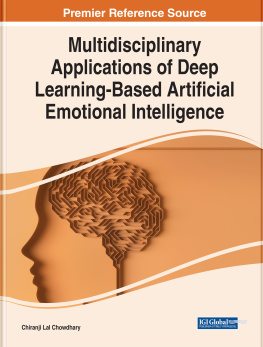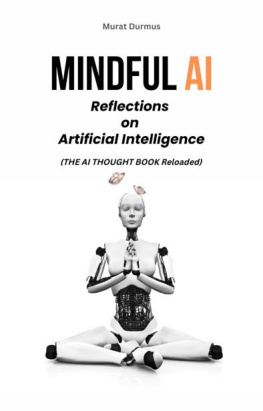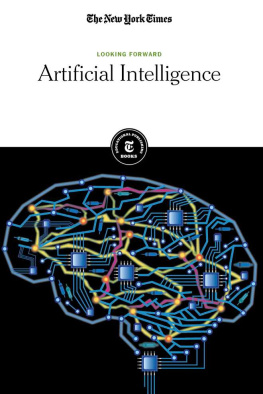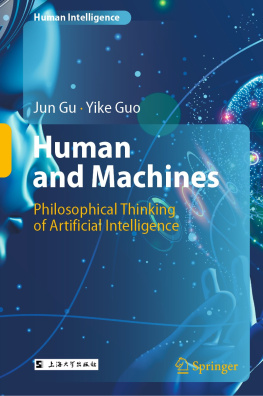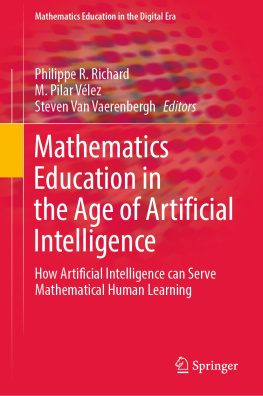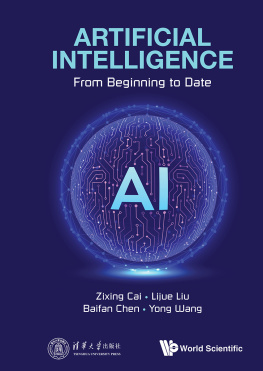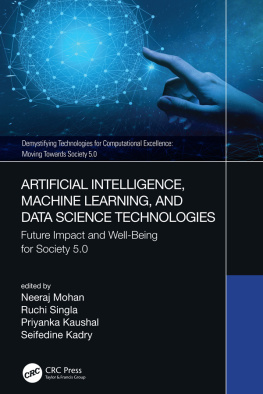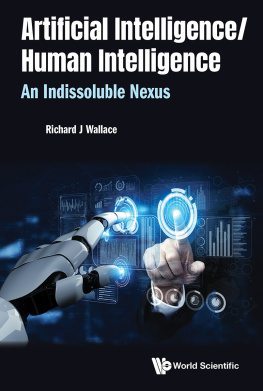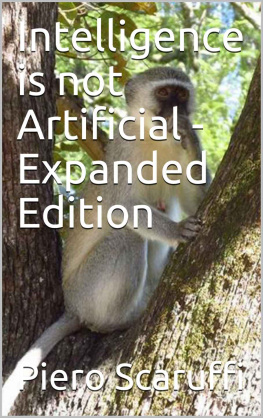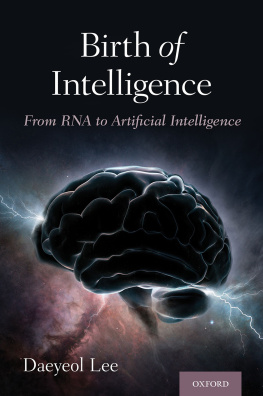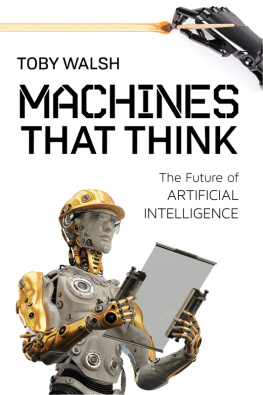
AI for Learning
AI FOR EVERYTHING
Artificial intelligence (AI) is all around us. From driverless cars to game winning computers to fraud protection, AI is already involved in many aspects of life, and its impact will only continue to grow in future. Many of the worlds most valuable companies are investing heavily in AI research and development, and not a day goes by without news of cutting-edge breakthroughs in AI and robotics.
The AI for Everything series will explore the role of AI in contemporary life, from cars and aircraft to medicine, education, fashion and beyond. Concise and accessible, each book is written by an expert in the field and will bring the study and reality of AI to a broad readership including interested professionals, students, researchers and lay readers.
AI for Immunology
Louis J. Catania
AI for Cars
Josep Aulinas & Hanky Sjafrie
AI for Digital Warfare
Niklas Hageback & Daniel Hedblom
AI for Art
Niklas Hageback & Daniel Hedblom
AI for Creativity
Niklas Hageback
AI for Death and Dying
Maggi Savin-Baden
AI for Radiology
Oge Marques
AI for Games
Ian Millington
AI for School Teachers
Rose Luckin, Karine George & Mutlu Cukurova
AI for Learning
Carmel Kent & Benedict du Boulay
AI for Social Justice
Alan Dix and Clara Crivellaro
For more information about this series please visit:
https://www.routledge.com/AI-for-Everything/book-series/AIFE
AI for Learning
Carmel Kent
Benedict du Boulay

First Edition published 2022
by CRC Press
6000 Broken Sound Parkway NW, Suite 300, Boca Raton, FL 33487-2742
and by CRC Press
4 Park Square, Milton Park, Abingdon, Oxon, OX14 4RN
CRC Press is an imprint of Taylor & Francis Group, LLC
2022 Carmel Kent, Benedict du Boulay
Reasonable efforts have been made to publish reliable data and information, but the author and publisher cannot assume responsibility for the validity of all materials or the consequences of their use. The authors and publishers have attempted to trace the copyright holders of all material reproduced in this publication and apologize to copyright holders if permission to publish in this form has not been obtained. If any copyright material has not been acknowledged please write and let us know so we may rectify in any future reprint.
Except as permitted under U.S. Copyright Law, no part of this book may be reprinted, reproduced, transmitted, or utilized in any form by any electronic, mechanical, or other means, now known or hereafter invented, including photocopying, microfilming, and recording, or in any information storage or retrieval system, without written permission from the publishers.
For permission to photocopy or use material electronically from this work, access www.copyright.com or contact the Copyright Clearance Center, Inc. (CCC), 222 Rosewood Drive, Danvers, MA 01923, 978-750-8400. For works that are not available on CCC please contact mpkbookspermissions@tandf.co.uk
Trademark notice: Product or corporate names may be trademarks or registered trademarks and are used only for identification and explanation without intent to infringe.
Library of Congress Cataloging-in-Publication Data
Names: Kent, Carmel, author. | Du Boulay, Ben, author.
Title: AI for learners / Carmel Kent, Benedict du Boulay.
Other titles: Artificial intelligence for learners
Description: First edition. | Boca Raton : CRC Press, 2022. |
Series: AI for everything | Includes bibliographical references and index.
Identifiers: LCCN 2021042773 | ISBN 9781032047553 (hardback) | ISBN
9781032039213 (paperback) | ISBN 9781003194545 (ebook)
Subjects: LCSH: Artificial intelligence--Educational applications.
Classification: LCC LB1028.43 .K46 2022 | DDC 371.33/4--dc23
LC record available at https://lccn.loc.gov/2021042773
ISBN: 978-1-032-04755-3 (hbk)
ISBN: 978-1-032-03921-3 (pbk)
ISBN: 978-1-003-19454-5 (ebk)
DOI: 10.1201/9781003194545
Typeset in Joanna
by Deanta Global Publishing Services, Chennai, India
Contents
by Rose Luckin
Foreword: The power of learning, the power of AI
Rose Luckin, Professor of Learner Centred Design at the UCL Knowledge Lab in London
I remember the moment when I first came across the term artificial intelligence or AI. I was sitting on the sofa, pondering over the University of Sussex (Brighton, UK) course prospectus for undergraduate students. I had recently turned 30 but had not gone to university when I left school. I had gone straight into work, as was expected by my family. Id worked in the financial services sector and had also taught in Further Education (FE) and secondary school. I had professional qualifications in finance and economics that I had achieved by day release from my full-time job, to study part time at the local FE college. But, as a mother of two young children, having taken a career break to be a stay-at-home mum, I had now decided that perhaps it was a moment for a career change and a degree seemed like a great first step towards that new career.
I thought that I should apply to study for a degree in a similar territory to my professional qualifications, in order for my application to be successful. I had very few choices of universities that were in easy travelling distance from where I was living and enabled me to study while living at home. So I had settled on the University of Sussex as the most suitable institution for me. As I sat on the sofa, looking through the various course options available at Sussex, my mind wandered into thoughts about what being a student again would be like and the prospectus fell from my lap. When I picked it up again, the page it had rested on was describing a course in Computer Science and Artificial Intelligence.
This was the first time that I had come across the term artificial intelligence. I read the course description. It was fascinating. Applicants did not need to have any prior experience with computers, and my existing A levels would be sufficient for admission to this course, provided I was fortunate enough to be selected from all the students who would be applying, of course.
I went out and bought one of the recommended textbooks, which was called Gdel, Escher, Bach: An Eternal Golden Braid, by Douglas Hofstadter. I read the textbook, it blew my mind and I loved it. However, I confess, I certainly did not understand it all. The book had hooked me in, and I added the Computer Science and Artificial Intelligence degree course to my UCAS application form, along with all those that had a strong economics or finance theme. I was rejected from all the courses in economics but invited for an interview to study Computer Science and Artificial Intelligence. This was the start of a fascinating journey with AI and the way that it impacts teaching and learning.
From the moment I started my degree course, I absolutely adored it. I looked at everything through the lens of an educator, because that is what I had become. Not only had I taught face to face, but I had also enrolled as a tutor with the Rapid Results College: an early version of what might now be an online course provider, in order to add extra income to the family purse. I marked students scripts, and I wrote course textbooks for the courses that I had once studied when working in finance. I therefore saw education as something that did not always have to be done on a face-to-face basis and I could see great possibilities for AI.
Next page

